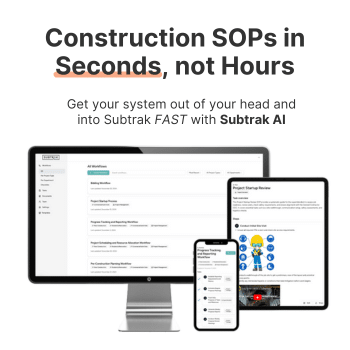Job Cost Tracking for Carpentry
The Job Cost Tracking workflow helps carpentry contractors maintain financial accuracy across projects. It covers recording labor hours, material usage, subcontractor charges, and overhead expenses. Managers reconcile costs, compare against budgets, and update forecasts for transparency. By following this process, carpentry companies reduce overruns, improve efficiency, and protect profitability. Clients benefit from confidence in cost control and transparent reporting. Teams gain accountability by documenting expenses and approvals. With this workflow in place, carpentry contractors can strengthen professionalism, improve efficiency, and deliver projects more reliably while maintaining financial stability.
Set up job cost codes based on budget categories (labor, materials, subs, equipment, etc.)
Enter original budget and any approved changes into job cost tracking system
Assign cost codes to all purchase orders, timecards, and subcontractor agreements
Record daily labor hours and costs to the correct job and task
Track material purchases and deliveries with matching invoices
Update subcontractor pay apps and payments under correct cost codes
Enter equipment rentals, fuel, or miscellaneous job expenses
Reconcile actual costs weekly or monthly against budgeted amounts
Flag overruns or under-spending for review with project team
Analyze cost-to-complete projections and adjust forecast if needed
Share job cost reports with project manager and leadership
Archive all cost data for final closeout and future estimating reference
👈 Use this SOP template inside Subtrak
Edit with AI. Customize in seconds. Store and share all your SOPs and checklists in one place.
